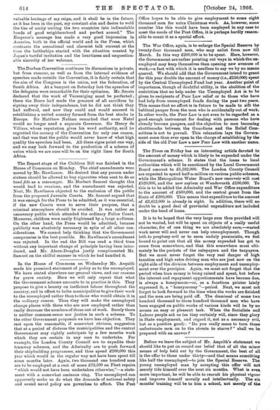The War Office, again, is to enlarge the Special Reserve
by twenty-four thousand men, who may enlist from now till March. In this way £200,000 is to be spent. Here, however, the Government are rather pointing out ways in which the un- employed may keep themselves than opening new avenues of work,—a fact with which it is needless to say we by no means quarrel. We should add that the Government intend to grant for this year double the amount of money (i.e., £150,000) spent by the Central Unemployed Fund last year. Another point of importance, though of doubtful utility, is the abolition of the restriction that no help under the Unemployed Act is to be given to recipients of Poor Law relief or to those who have had help from unemployed funds during the past two years. This means that no effort is in future to be made to sift the habitual pauper from the man who is accidentally out of work. In other words, the Poor Law is not even to be regarded as a good enough instrument for dealing with persons who have already become paupers, and the objection to men becoming shuttlecocks between the Guardians and the Relief Com- mittees is not to prevail. This relaxation lays the Govern- ment more than ever open to the charge of establishing by the side of the old Poor Law a new Poor Law with another name.














































 Previous page
Previous page